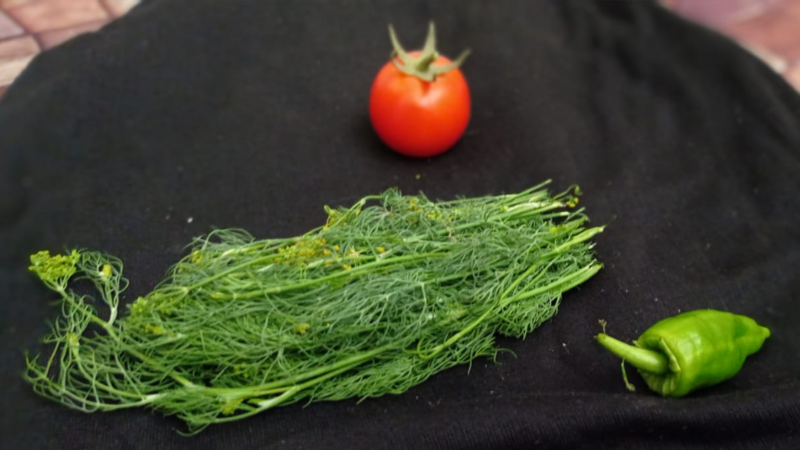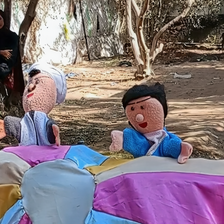The Electronic Intifada 29 August 2024

Omar Abou Jalal, the author’s brother, has grown a rooftop garden to fend off hunger, tending to tomatoes, peppers, cucumbers, eggplants and supplementary herbs such as dill.
Amid the sounds of nonstop Israeli bombing, my brother Omar picked the first tomato and cucumber from the small nursery that he established on the roof of his house.
“It was the first salad I had in months,” my brother said during a phone conversation. “I feel like I’ve achieved something on par with Neil Armstrong when he landed on the moon.”
Omar had decided not to obey the Israeli army’s orders to evacuate the northern Gaza Strip at the beginning of its genocide on 7 October 2023. He decided to stay in his home.
But Omar was afraid for his wife and children, so he let them flee with my family and me to the southern Gaza Strip.
Since then, other than a few temporary moves for safety reasons, Omar has lived alone in his home.
Israeli forces arrived in the residential neighborhood in Gaza City where my brother lives on 27 October.
The Israeli army prevented the entry of basic foodstuffs such as vegetables and meat into the northern Gaza Strip, trying to force residents to flee south.
Despite this, tens of thousands of citizens, like my brother Omar, remain steadfast in their homes in the north and refuse to leave them.

Growing eggplant on rooftop.
Because of the “starvation policy” and the Israeli army destroying agricultural areas in the city, the prices of vegetables have risen incredibly.
Before Israel launched its attacks, a kilo of tomatoes cost two shekels (about 55 cents). Now the price can be 300 shekels ($81.77). The price of a kilo of green peppers did not previously exceed five shekels ($1.36). Now it can reach 600 shekels (more than $160).
Rooftop garden
To try to feed himself, Omar, like many residents of the northern Gaza Strip, planted various vegetable seedlings on the roof of his home.
Omar brought basins from the remains of destroyed agricultural land, placed them on the roof of his house and filled them with soil. He was able to produce seeds from vegetables that he had, and last March, he planted them in the basins.
Omar planted tomatoes, cucumbers, eggplants and potatoes, serving as a reminder of the role agriculture on both a small and large scale has long played in the region.
According to the United Nations Satellite Center and the Food and Agriculture Organization of the United Nations, the Gaza Strip has 151 square kilometers of agricultural land, which constitutes about 41 percent of the coastal territory.
The agricultural sector’s contribution to the Gaza Strip’s GDP amounted to about 11 percent in 2022, a report issued by the Palestinian Central Bureau of Statistics detailed.
Another report, this one from Euro-Med Human Rights Monitor, stated that the Israeli occupation forces destroyed more than 75 percent of the agricultural land in Gaza during the ongoing war.
“[T]he Israeli army has worked methodically to destroy livestock, agricultural lands and bird farms in a consistent manner with the clear intention of starving the populace and denying them access to the staple foods of fruits, vegetables, and white and red meat. This has left the population’s survival dependent on the Israeli decision to allow or prohibit the entry of humanitarian aid,” Euro-Med Human Rights Monitor stated.

At left, mtabbal (a mashed eggplant dish), and at right, daqqa (a traditional condiment from Gaza), prepared by Omar Abou Jalal.
Omar says that sometimes huge cargo planes bearing the Jordanian, UAE or another country’s flag have dropped tons of food. Desperate Gazans have been killed or injured by the Israeli military chasing after food convoys or by aid drops where the parachutes failed to deploy.
Hussam Abu Qamar, a general physician at the clinics of the UN agency for Palestine refugees, UNRWA, told The Electronic Intifada that the residents of Gaza “suffer from severe degrees of malnutrition due to the ongoing war on the Gaza Strip.”
Abu Qamar explained that the residents of the northern Gaza Strip depend on canned, preservative-heavy legumes as their main source of food, but this caloric intake does little to help avoid malnutrition.
The government media office in Gaza said in June, “The use of starvation, thirst and denial of medical care as a weapon by the brutal Zionist occupation during this savage aggression is a confirmed and compounded war crime, confirming its continued major crime of genocide against our people in Gaza, in full view and hearing of the whole world.”
Standing up to that reality likely makes the salad of Omar, who went from 176 pounds before the war to 121 now, a little more savory as he perseveres in the face of war crimes and genocide.
Rasha Abou Jalal is a journalist in Gaza




